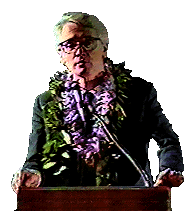
 Return to the Hawaiian Independence Home Page or the Legal Documents Index
Return to the Hawaiian Independence Home Page or the Legal Documents Index
December 28, 1993
Mable Smyth Hall, Honolulu
- Excerpts -
(see the full text of Boyle's testimony)

"...now the United States government, after one hundred years, has finally and officially conceded, as a matter of United States law, that Native Hawaiian people have the right to restore the Independent Nation State that you had in 1893 when the United States government came and destroyed it. And also then that as a matter of international law the Native Hawaiian people have the right to go out now and certainly proclaim the restoration of that State... this resolution clears up all these matters... You don't need to petition Congress to do it. Congress has given you everything you need right here to do it, if that's what you want to do. The United Nations Charter provides the rest of the authority to do it."
"Congress is effectively conceding now that the (1959 statehood) vote is meaningless, as a matter of international law and United States domestic law. So you're not bound by it. Rather I'm suggesting you're now free to determine your own fate pursuant to the principal of self-determination."
"The State of Hawai'i, the federal government, are... the civilian arms of the military occupation authority, and... do not have sovereign powers. The sovereignty resides in the people."
"Who's land is it? Well, from what Congress seems to be saying, it's the land of the Native Hawaiians. The Native Hawaiian people still have sovereignty... You can't trespass on your own land. The trespassers then become the State of Hawai'i, and the land developers, and the golf courses, and the resorts. You are simply the Native Hawaiians asserting your rights under international law... this reversal of positions, between who is the criminal and who is the victim, who is asserting their rights and who is violating their rights, has been effectively conceded by Congress."
"... these are official findings of fact and law, by the Congress of the United States. These findings bind all state and federal courts here in Hawai`i."
"As a litigator before the International Court of Justice, I would be able to take this law to the World Court, and say, 'The United States government has now officially conceded that it illegally invaded and occupied the Kingdom of Hawai`i, and for this reason the native people of Hawai`i would be entitled to a restoration of their independent status as a sovereign nation state.'"
"I could not predict how long this would take, what would be the consequences, how many states will recognize you, but I take it that the plight of the Hawaiian people is generally well known in the world, and there's a great deal sympathy ...it might be that you would be able to obtain recognition quickly. And especially if you pursue this process in accordance with principals of peaceful, non-violent struggle. And I submit that's the most effective technique you have today... Gandhi threw the mighty British Empire out of India without using force. People power, what we call it today. And I submit that the Native Hawaiian people would be able to do the same thing, moving in this direction and adopting the techniques of peaceful, non-violent action, which is what Gandhi called for."
"I would certainly caution you against trying to seek the same type of treatment that the federal government has doled out to the Native Americans. Moreover, on the basis of this statute, you're entitled to a lot more..."
"...an Independent Sovereign Nation State is one way a people who are threatened with extermination by means of genocide can attempt to protect themselves... What is the best way to protect the existence of your people, as a people? ...to proclaim your own State, and then ultimately seek international recognition and finally UN membership..."
"...it's your future and that of your children and your children's children that is at stake."
What are the Criteria ... How can it be done?
Territory
"First, a fixed territory, and clearly we have the Hawaiian Archipelago... Who's land is it? Well, from what congress seems to be saying, it's the land of the Native Hawaiians. The Native Hawaiian people still have sovereignty. The sovereignty inheres in you. And now it is for you to decide what to do with this sovereignty... the title to the land rested and still rests, under international law, with the Native Hawaiian people."
Population
"Second, a population, a distinguishable population of people, the Native Hawaiians, those who would trace their ancestry back before the appearance of Europeans on these lands... Certainly the Hawaiian state could take the position that you'll set up a procedure to provide citizenship to all people who are habitual residents of the new State of Hawaii as of a certain date... on a level of equality with everyone else."
Government
"Third, a government, and here you have ... the Kupuna (Elders) Council, that you've traditionally had. You don't need a government along the lines of the federal government of the United States or the State of Hawai`i to have a government. Rather what you need is a way to organize your people to govern your relations among each other, and clearly you have that."
International Relations
"And fourth, the capacity to enter into international relations, to deal with other states, and to keep your commitments. As I understand it, there are already states in the Western Pacific region that support the Native Hawaiian people and probably would be prepared to give you diplomatic recognition as an independent state... You would probably obtain recognition in that capacity from a fairly large number of states."
See Full text of Boyle's testimony

 Return to the Hawaiian Independence Home Page or the Legal Documents Index
Return to the Hawaiian Independence Home Page or the Legal Documents Index